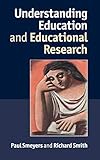Understanding education and educational research /
Material type: TextDescription: vii, 221 pagesISBN:
TextDescription: vii, 221 pagesISBN: - 9781107009202 (hardback)
- 370.72 SME
| Item type | Current library | Collection | Call number | Status | Date due | Barcode | |
|---|---|---|---|---|---|---|---|
 Reference
Reference
|
Mahindra University Indira Mahindra School of Education General Stacks | Education | 370.72 SME (Browse shelf(Opens below)) | Not for loan | E0598 |
Machine generated contents note: Introduction; 1. Education and its research; 2. The nature of social science; 3. The idea of method; 4. The nature of philosophy; 5. The art of research; 6. Language, truth, and meaning; 7. On the dominant nature of educational research and its shortcomings; 8. Research, policy and practical reasoning; 9. The limits of measurement; 10. Parenting and government intervention in the family (case study I); 11. Researching happiness and well-being (case study II); 12. Philosophy and research.
"Educational research is widely believed to be essentially empirical, consisting mainly of collecting and analysing data, with randomised control trials as the 'gold standard'. This book argues that good educational research is often philosophical in nature. Offering a critical overview of the current state of educational research, the authors argue that there are two factors in particular that distort it. One is that throughout the world it is expected to serve the interests of the state in securing educational improvements, as measured by standardised examination results, and to demonstrate 'scientific' credentials sufficient to guarantee absence of ideological bias and carry conviction. The other is that learning to do educational research is generally seen as a matter of being trained in empirical 'research methods'. The authors demonstrate, by contrast, that good educational research needs the rigorous thinking characteristic of philosophy, and that philosophical treatments themselves sometimes constitute such research"--
"Educational research is widely believed to be essentially empirical, consisting mainly of collecting and analysing data, with randomised control trials as the 'gold standard'. This book argues that good educational research is often philosophical in nature. Offering a critical overview of the current state of educational research, the authors argue that there are two factors in particular that distort it. One is that throughout the world it is expected to serve the interests of the state in securing educational improvements, as measured by standardised examination results, and to demonstrate 'scientifi c' credentials suffi cient to guarantee absence of ideological bias and carry conviction. The other is that learning to do educational research is generally seen as a matter of being trained in empirical 'research methods'. The authors demonstrate, by contrast, that good educational research needs the rigorous thinking characteristic of philosophy, and that philosophical treatments themselves sometimes constitute such research"--
There are no comments on this title.

